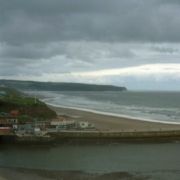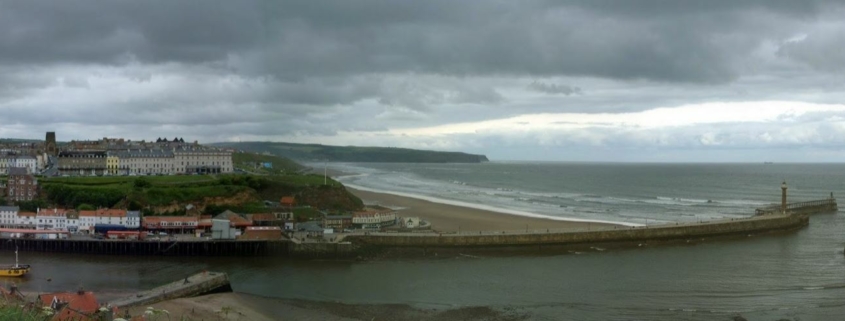Ode to Yorkshire
YORKSHIRE – IT’S GRADELY!
A guest blogpost from Anne Hayto, folk music enthusiast and co-founder & Secretary of the Aylestone Meadows Appreciation Society
When planning holidays, as a Yorkshire lass born and bred, my thoughts usually turn northwards and this year it was an August week in Whitby, mingling with the scarily dense crowds of people who obviously had the same idea as me. What is it that brings people back time and again to the lands of their birth and childhood? I grew up in Wakefield, once part of the West Riding, but I left there in my early twenties to seek a life away from ‘the dark satanic mills’. I’ve spent most of the rest of that life wishing I had returned, but of course, the mills are now apartments and the coal mines which surrounded my home town are no more. I have remnants of family still in Wakefield, but most of them are gone now. Yet still I return even though I’m a stranger in the old town.
It’s not really Wakefield that draws me back though. It’s those ‘broad acres’ of Yorkshire. God’s own county in all its scenic glory and with all its contrasts. Grim post-industrial towns are a stone’s throw from the brooding hills, moors and millstone grit of the Pennines. The Dales, Wolds and the North York Moors are a naturalist’s and walker’s paradise, punctuated by lovely market towns and coastal havens which are now tourist honeypots.
It’s a funny thing how my speech changes when I get a couple of miles north of Sheffield. No-one could mistake me for a southerner but I now have a more generic northern accent, rather than obviously Yorkshire. Once I cross over the border I become a proper Yorkshire woman again! And of course, Yorkshire is the biggest county and inevitably the accent varies according to geography. Then there’s Yorkshire dialect – a different kettle of fish altogether. You can’t really write dialect. It’s an oral form of communication, not hidebound by rules of pronunciation, spelling or grammar. Yorkshire dialect has its roots in Celtic and Viking incursions and it changes with the process of time, culture and geography. A separation of twenty miles can produce different words, different pronunciations and subtle changes in accent not obvious to all. I can always spot a Wakefield accent. It’s different from Leeds, only ten miles away. A good example of geographical changes occurred the other day when a friend from Sheffield and I talked about “walking through a ginnell” (that’s an alley to you). We both knew what a ginnell was but she pronounced it with a j whilst I used a hard g to start the word. Twenty miles produces a totally different pronunciation of the same dialect word. My maternal grandad was a dialect speaker. He addressed us as ‘thee or tha’ and had a vocabulary that is probably rarely used now. My mum worked in a shirt and underwear factory – known as ‘the shirt and shimmy oile’ (hole) and Grandad would tell us to “put t’wood in th’oile” (shut the door). Mum and Dad did not encourage me to emulate Grandad’s speech, knowing that a dialect speaker was unlikely to progress in the world. The everyday use of Yorkshire dialect still lingers on in some of the ex-mining areas and in parts of rural Yorkshire, but it’s mainly gone now and I lament its passing. In Whitby this summer I enjoyed listening to the curly vowels of the North Riding; different from the flattened sounds of the West Riding but not a Geordie accent either.
I enjoyed the Yorkshire food too. Fish and chips cooked in good beef dripping, Yorkshire curd tart, tomato sausage, ginger parkin and Yorkshire brak (find out for yourself!) made me heavier but happier. Sitting on the West cliff overlooking the harbour and abbey and listening to the grey North Sea crash against the quay side I shivered in the chilly August evening and pondered the meaning of Yorkshireness. There’s a great pride in being Yorkshire that is not apparent in every area of the nation. The Yorkshire white rose is everywhere – on lorry logos as they traverse the country, on window and car stickers and on the prolific flags. We Yorkshire folk know what we’ve got and we think it’s Champion!





